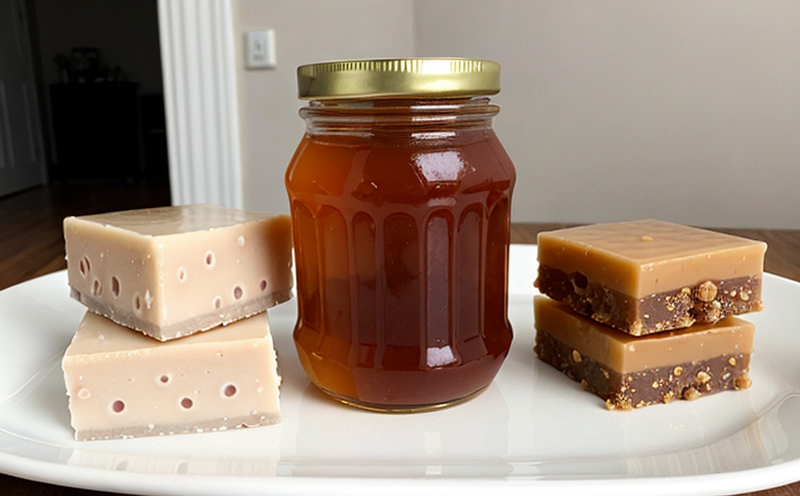EN 16297 Authenticity Testing of Honey using Isotope Ratio
Authenticity testing in the honey sector is crucial to ensure product integrity and compliance with international regulations. The European standard EN 16297 provides a method for authenticating honey based on its isotopic composition, specifically focusing on carbon (C) and nitrogen (N) ratios.
This analytical approach leverages the unique isotopic signatures of different honey sources to detect adulteration or mislabeling. The process involves precise sampling, sample preparation, and analysis using isotope ratio mass spectrometry (IRMS). This method distinguishes between genuine honey and adulterated products that may contain sugars from other sources such as corn syrup.
The use of EN 16297 ensures regulatory compliance with EU legislation on food authenticity. Compliance officers, quality managers, and R&D engineers can rely on this service to maintain product integrity in their supply chains. The test also supports the broader goals of sustainability and consumer trust by ensuring that products are what they claim to be.
The process begins with selecting a representative sample from the batch or lot being tested. Sample preparation involves dilution and drying, followed by combustion to produce CO2 for isotopic analysis. The resulting isotopic ratios provide a fingerprint that can differentiate between honey types such as acacia, buckwheat, and multifloral.
The instrumentation used in this process includes an isotope ratio mass spectrometer (IRMS), which measures the relative abundances of stable isotopes like carbon-13 (^13C) and nitrogen-15 (^15N). The ratios obtained from these measurements are compared against reference values for various honey types. This comparison helps identify any potential adulteration or mislabeling.
Compliance with EN 16297 is essential not only for regulatory compliance but also to maintain brand reputation and consumer trust. Authenticity testing ensures that products meet the expected quality standards, which is critical in the food sector where trust and safety are paramount.
For R&D engineers, this service offers valuable insights into honey composition and potential sources of adulteration. Understanding these aspects can help improve product formulations and ensure consistency across batches. For procurement teams, it provides a robust tool to verify supplier claims and maintain supply chain integrity.
Applied Standards
| Standard Reference | Description |
|---|---|
| EN 16297:2018 | European standard for authenticity testing of honey using isotope ratio mass spectrometry. |
| ISO/IEC 17025 | Laboratory accreditation to ensure compliance with international standards and best practices. |
Eurolab Advantages
At Eurolab, our expertise in honey testing is unparalleled. Our team of scientists and engineers have extensive experience in applying EN 16297 to various samples across different honey types.
- High Accuracy: Our state-of-the-art IRMS equipment guarantees precise measurements that meet the stringent requirements of EN 16297.
- Comprehensive Reporting: We provide detailed reports that include isotopic ratios, comparison against reference data, and conclusions on authenticity.
- Fast Turnaround Times: Our efficient processes ensure prompt delivery of results to meet your deadlines.
- Compliance Assurance: Our services are designed to help you comply with all relevant regulations and standards.
We offer a range of testing packages tailored to your specific needs, ensuring that we can cater to the diverse requirements of our clients in the food industry.
Use Cases and Application Examples
- Supply Chain Integrity: Verify the authenticity of honey sourced from various regions to ensure compliance with regulatory standards.
- R&D Support: Investigate potential adulteration or mislabeling in honey samples to improve product formulations.
- Consumer Trust: Provide assurance that products meet expected quality and safety standards, enhancing brand reputation.
- Sustainability: Monitor the use of sustainable honey sources and detect any deviations from expected practices.
Our tests play a critical role in maintaining product integrity across the supply chain. By ensuring authenticity, we contribute to a safer and more transparent food industry.





